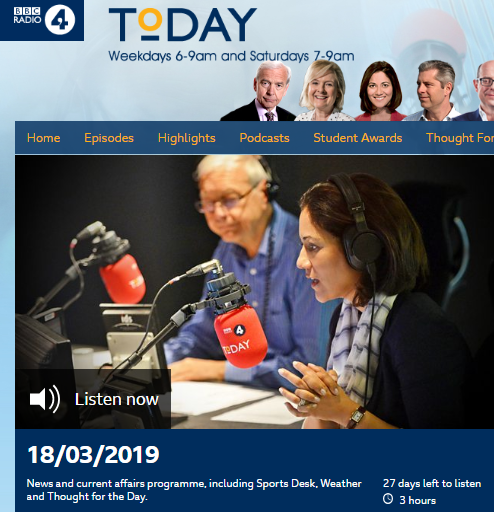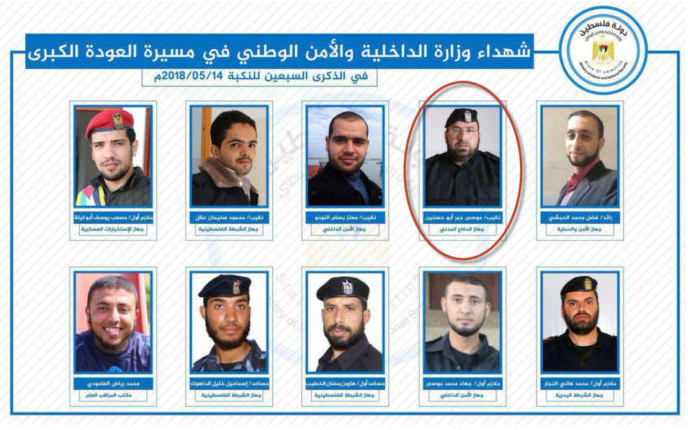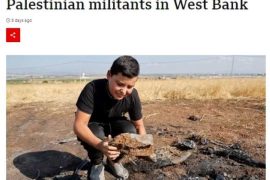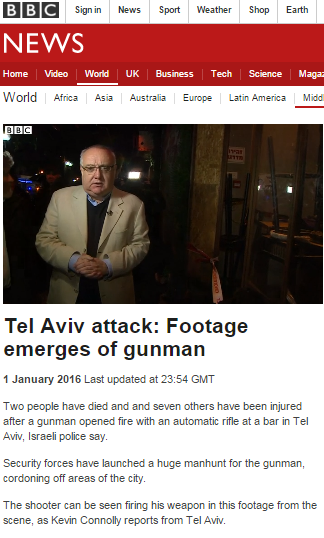h/t GB
Since February 28th BBC audiences have seen several examples of uncritical amplification of a UNHRC Commission of Inquiry into the ‘Great Return March’ events along the border between Israel and the Gaza Strip.
BBC News website unquestioningly amplifies UNHRC’s report
BBC Radio 4 tells listeners that Gaza rioters were ‘innocent civilians’
Disproportionate focus in BBC News report on UNHRC speech
As has been documented here over the past twelve months, the BBC’s coverage of the ‘Great Return March’ weekly violent rioting has uniformly portrayed the events as mere “protests” and “demonstrations”. BBC reporting has serially downplayed or erased the violent nature of the events and the role of terror groups in the organisation and execution of the provocation has been repeatedly ignored.
On March 18th the Commission of Inquiry presented its report at the Human Rights Council’s 40th session in Geneva. Even before that presentation had taken place, the BBC Radio 4 news and current affairs programme ‘Today’ aired an item (from 02:49:40 here) in which that partisan framing of the ‘Great Return March’ rioting was repeated.
Presenter Nick Robinson introduced the item with a portrayal of Israel as an ‘occupying force’ in the Gaza Strip despite the fact that Israel completely withdrew from the territory nearly 14 years ago.
[emphasis in italics in the original, emphasis in bold added]
Robinson: “A commission established by the UN Human Rights Council to investigate what it calls the disproportionate and indiscriminate use of force by the Israeli occupying forces against Palestinian civilians is due to deliver its conclusions later today. Israel has always insisted that it has no choice but to protect its border with Gaza using, if necessary, live fire and dismisses the report as anything but independent.”
Having framed those participating in year-long acts of violence as “civilians” despite the fact that studies have shown that the vast majority of those killed had links to terrorist organisations, Robinson went on to falsely assert that ‘the core facts are not in dispute’ even as he described the violent rioting as “protests”.
Robinson: “The core facts though are not really in dispute. The United Nations has said that over a year of weekly protests at the border with Gaza [sic] 193 Palestinians have been killed and more than 26 thousand injured. Among them is Dr Tarek Loubani, a Canadian Palestinian associate professor at the University of Western Ontario.”
Loubani: “I’d like to say that I was doing something heroic when I got shot but I wasn’t. I was standing. It was quiet, there was nothing else happening on the field. I was just loitering, talking to some of my colleagues. I was marked clearly in greens and had been on the field for a few hours so it was obvious to the soldiers, who were very close to us, exactly what we were doing. And I did not expect that I would be targeted. Up until that point it had been six weeks with no injuries of medics. All of a sudden I heard a loud bang and felt an incredible pain in my legs and found myself on the ground. The paramedic who rescued me, Musa Abuhassanin, Musa was killed an hour later when he was shot in the chest.”
Readers may recall that the BBC News website published an article about Loubani last May in which he made the same claims. As was documented here at the time:
“…a photograph of Captain Musa Abuhassanin also appeared on a poster released by Hamas showing some of its members killed on May 14th.”
As noted here when the BBC interviewed Loubani in 2015:
“…in addition to being a doctor, Kuwait-born Tarek Loubani (who moved to Canada at the age of ten) is a veteran political activist who in 2003 was arrested near Jenin and deported from Israel due to his activities with the International Solidarity Movement (ISM). Loubani was also arrested in Egypt in 2013 whilst trying to enter the Gaza Strip and in 2014 was detained at Ben Gurion airport.”
Robinson of course did not bother to provide his listeners with that relevant background information before introducing another doctor.
Robinson: “Well listening to that is an orthopaedic surgeon all too familiar with these sorts of injuries. He works at the al Shifa hospital. He’s Dr Mahmoud Mattar and he’s at the United Nations in Geneva today to hear what the UN Human Rights Commission will have to say. […]
Once again Robinson promoted the BBC’s chosen framing:
Robinson: “The Israeli military say that they often fire into the legs of protesters but that they only do it as a last resort and they do it to avoid killing people. Explain to us what the impact of the injury you treat and see is, please.”
After Mattar had described the injuries and the difficulties faced by hospitals trying to treat large numbers of patients (but without clarifying that the hospital where he works is run by the same terror organisation which organises the violent rioting), Robinson again gave an inaccurate portrayal of the past year’s events along the border.
Robinson: “The human toll is terrible but what do you expect from the commission because clearly Palestinians will say they have a right to protest peacefully but Israel will say if you approach the border you are a risk to the Israelis on the other side of the border and they have repeatedly warned that people who do approach the border may well be shot.”
Mattar replied with the claim that hospitals in the Gaza strip should be given better equipment in order to deal with the injuries and Robinson – obviously looking for a political sound-bite – interrupted him.
Robinson [interrupts] “So you think the right reaction today is a humanitarian response – more money for medical care – rather than a political response about who is to blame.”
Mattar: “Yes actually I’m not here to blame anyone actually. With all the aggression we know by all the international law that the protester have the right to demonstrate peacefully. In addition we also have the right to be treated fully as the international world.”
Robinson: “But of course the Israelis would say they have the right under international law to defend their border.”
Mattar: “Yes actually I’m talking from this point as a medical professional. I’m not know too much about the border and what happen in the border but actually what I know…”
Apparently realising that he was not going to get the reaction he was looking for, Robinson interrupted his interviewee again and closed the conversation.
Robinson [interrupts]: “But you will be back, Dr Mattar, in Gaza soon.”
Mattar: “Yeah, yeah.”
Robinson: “Well thank you so much for taking the time to join us.”
The BBC’s consistently one-sided coverage of the ‘Great Return March’ over the past twelve months, means that audiences lack essential background information on that topic. Rather than try to make up for the serial failure to clarify that what it uniformly portrays as “protests” and “demonstrations” is actually violent rioting which has included hundreds of petrol bomb attacks, IED attacks, grenade attacks and shooting attacks as well as infiltration attempts, this latest BBC item again downplays the threats facing Israel and ignores the fact that the violence is orchestrated by terror groups. Once again we see unquestioning amplification of the UNHRC report without any mention of its defects and the continuing promotion of a blatant politically motivated narrative.
Related Articles:
BBC WS amplifies former ISM activist’s falsehoods about Gaza blockade
BBC again amplifies Gaza claims from political activist medic




